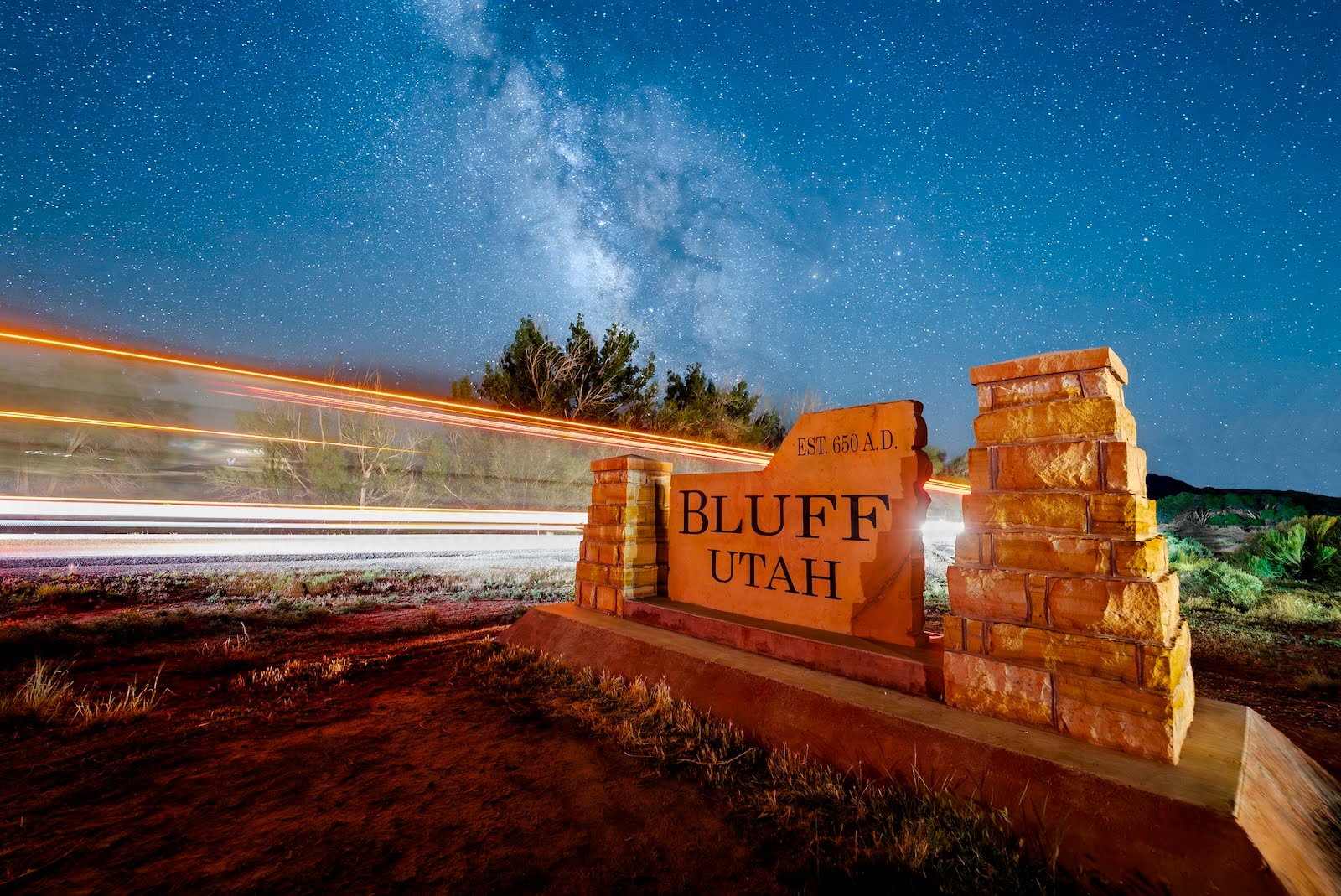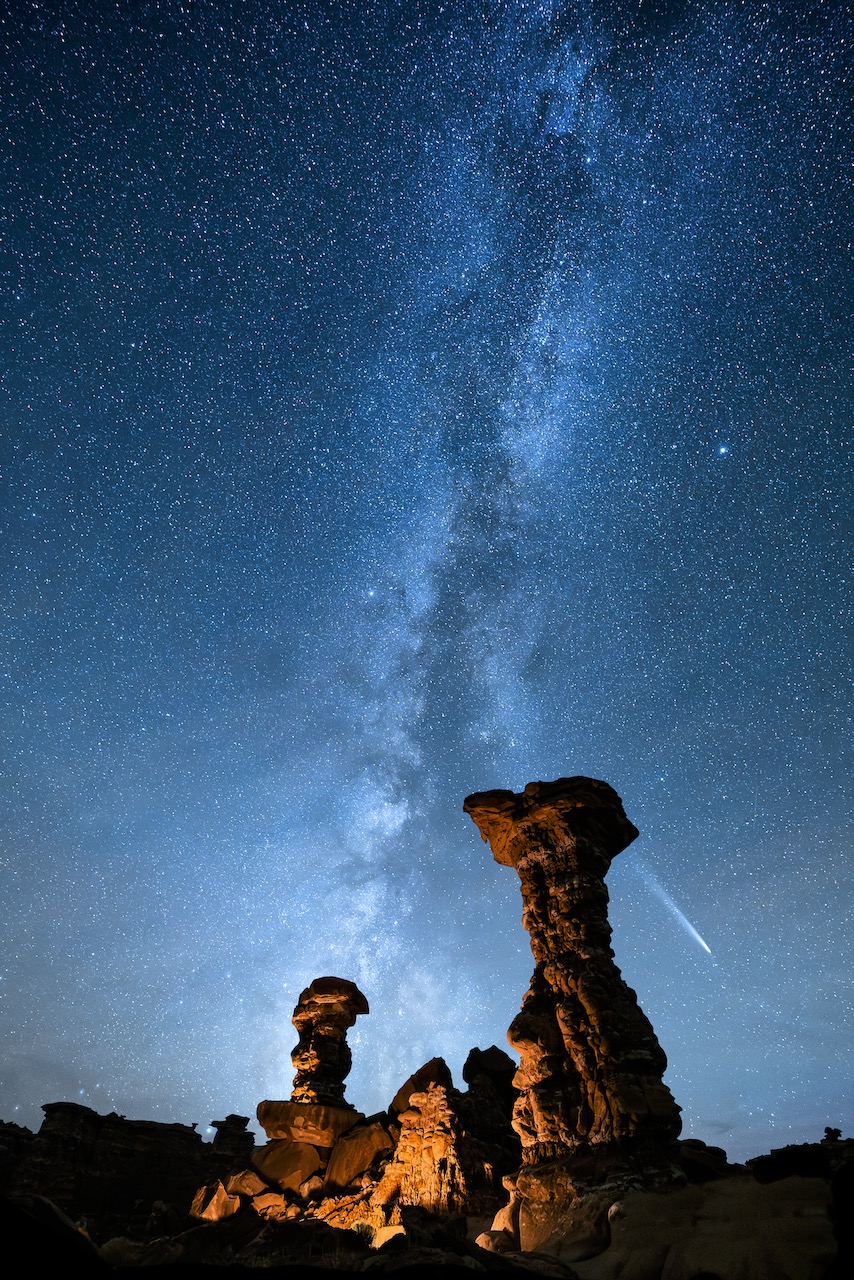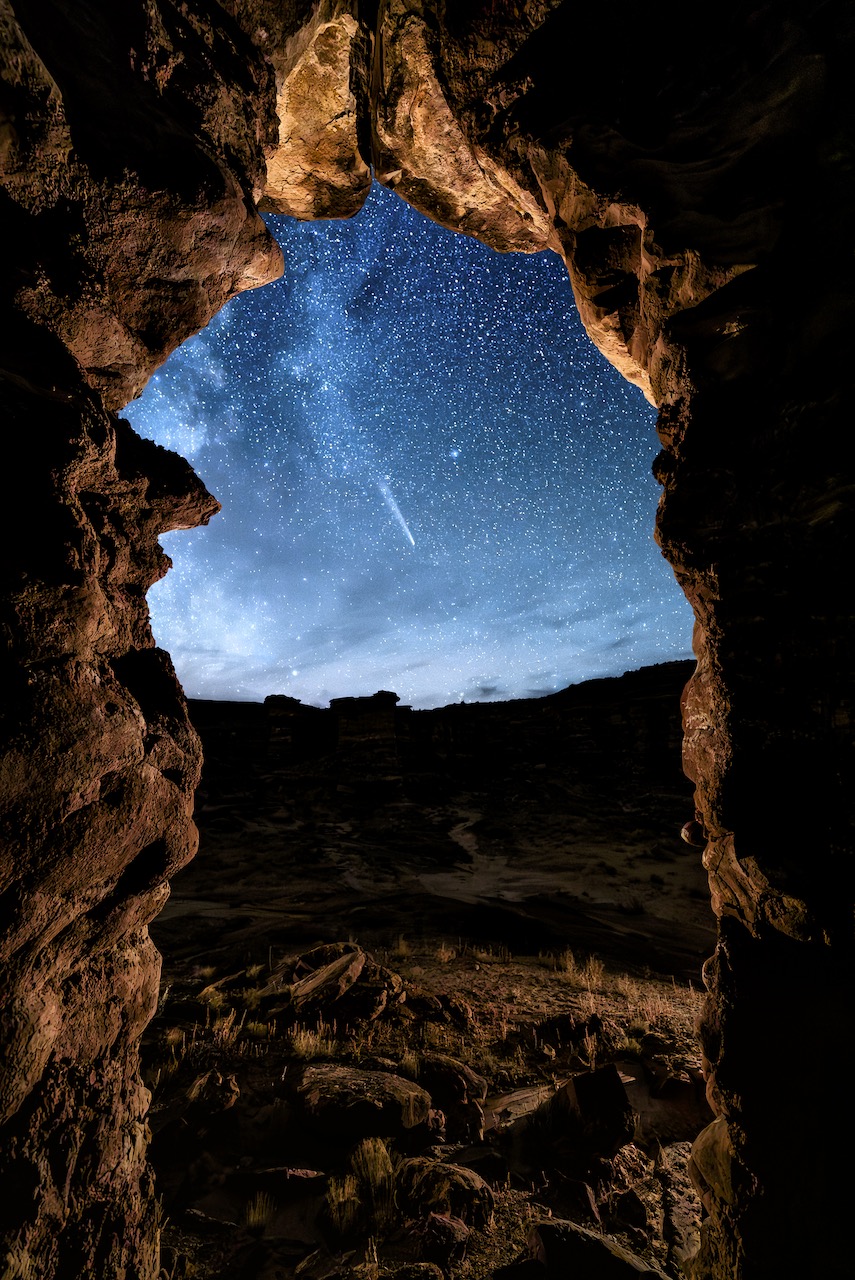Note: This article by Education Director Sarah Burak originally appeared in the Bears Ears Partnership 2025 Partnership Magazine, which you can read online as a PDF here. Sarah details the multi-year process of applying for Dark Sky Community status, and what it means for Bluff. Since writing this in early 2025, the Town of Bluff was officially designated a Dark Sky Community by the International Dark Sky Association in June 2025.

Bluff is dark. It’s very dark. The surrounding landscape is even darker. The Milky Way, that beautiful arch of dust and gas sweeping across the sky, is readily visible most nights. Planets, comets, and meteors are easily seen with the naked eye. When camping we joke that we’ll say goodnight after we see a shooting star – and then go immediately to bed because shooting stars are so frequent.
Over the last several years, I have had the pleasure to work with the Town of Bluff on becoming an International Dark Sky Community. Gaining this designation is not a simple task. There are a multitude of hurdles to overcome and areas of consensus to gain. But as we’re rapidly losing natural darkness worldwide, it was important to do what we could to protect this resource at home and set an example for other gateway communities to public lands. This designation isn’t about being dark, it’s about preserving the dark. To become a Dark Sky Community, you must demonstrate the desire and ability to protect natural darkness.
Preserving Stars is Preserving Lifeways
This dark sky designation is a natural step for Bluff, given that we are surrounded by designated Dark Sky Parks, including Goosenecks State Park, Hovenweep National Monument, Natural Bridges National Monument, and recently designated Dark Sky communities such as Moab and Castle Valley. Enjoying and learning from the dark sky is already a major aspect of Bluff’s quality of life. Since 2016, an annual star party has been held in Bluff during the winter months, with dark sky conservation talks, Indigenous star stories, constellation tours, and telescope viewing. What began with Bluff Elementary School programming for students and parents has expanded into two community events each year. These events are a collaboration between local partners including Bears Ears Partnership (BEP), Canyon Country Discovery Center, Utah State Parks, National Park Service, Bureau of Land Management, local schools, and volunteers. We are also planning our first-ever Dark Sky Festival to be held in late November 2025, which will expand our efforts in community education by sharing the wonder of the night sky and promoting reverence and respect.
 Preserving the dark sky is a crucial aspect of many of BEP’s and our partners’ values and priorities, from protecting cultural practices requiring darkness to boosting sustainable astrotourism, as well as limiting impacts on nocturnal wildlife, such as bats, owls, and desert foxes. By minimizing light pollution, we are helping to preserve these species and maintain the delicate balance of our local ecosystems. Bluff’s designation would also align with the Bears Ears National Monument co-management model outlined in the preferred Alternative E, which would seek a Dark Sky designation for the Monument, preserving the “earth-to-sky” epistemology of the Coalition Tribes. For example, traditional stories emphasize the significance of the night sky in Diné culture. The Navajo word for constellations is ”So’ Dine’e,” which translates to “Star People.”
Preserving the dark sky is a crucial aspect of many of BEP’s and our partners’ values and priorities, from protecting cultural practices requiring darkness to boosting sustainable astrotourism, as well as limiting impacts on nocturnal wildlife, such as bats, owls, and desert foxes. By minimizing light pollution, we are helping to preserve these species and maintain the delicate balance of our local ecosystems. Bluff’s designation would also align with the Bears Ears National Monument co-management model outlined in the preferred Alternative E, which would seek a Dark Sky designation for the Monument, preserving the “earth-to-sky” epistemology of the Coalition Tribes. For example, traditional stories emphasize the significance of the night sky in Diné culture. The Navajo word for constellations is ”So’ Dine’e,” which translates to “Star People.”
“Every Native nation has used the stars for guidance and looked to them to remember stories that were taught and given to them by their elders,” says Wanda Ketchum, a Diné elder and teacher at Bluff Elementary, who has presented star stories. “Stars guide us to look and know when seasons will change, planting seasons, and appropriate ceremonies to be performed.”
"In the beginning when the constellations were being sent into Father Sky, a ceremony was performed for the stars," Ketchum adds. "They each were told where to place themselves and what their contribution would be throughout time. The night would hold the stars for all human brothers and sisters, four-legged brothers and sisters, winged brothers and sisters, and the insect brothers and sisters. Because they were the ones who helped set the stars with their faith and prayers that accompanied the sacred songs, the medicine men sang when the stars were sent to their places in Father Sky."
Lighting the Way Towards Progress
The Dark Sky Association has very explicit requirements for limiting light pollution, such as having fully shielded fixtures and limiting the number of lumens on a property. With incorporation, the Town of Bluff was able to establish its own Planning and Zoning commission to create ordinances needed for the designation. After many public meetings, hearings, and education presentations, we finally passed a lighting ordinance in December 2019. Following a 2022 amendment to better align with the Dark Sky Association guidelines, we established a Dark Sky Committee to begin the application process.
“Our dark skies are our collective legacy. Preserving them is honoring them, and it’s the least we can do as the collective beneficiaries of all the majesty we witness,” says Malyssa Egge, a founding member of Bluff’s Planning and Zoning Commission.

Beyond enacting regulations to ensure dark sky preservation, communities must demonstrate a commitment to the ordinance. This includes residents and businesses coming into compliance by replacing lighting fixtures or reducing exterior lighting. Communities are also required to monitor and record sky-glow data and provide educational programming about the importance of dark skies. Since 2022, volunteers have been taking baseline readings in and around Bluff and recording this information in a database.
In 2024, a formal partnership between Town of Bluff and Bears Ears Partnership was solidified, helping to push us over the finish line. BEP has agreed to take on educational efforts, providing at least two programs yearly, and sky monitoring on a seasonal basis. This ensures that these requirements are met and can continue to be met in the future. With the help of many community members and leaders, Bluff’s Dark Sky Community application was submitted for consideration in December 2024. Now we wait, but anticipate celebrating our designation – and the bright future for Bluff’s dark skies – in 2025.
Read the Dark Sky International's article about the Town of Bluff's designation in June 2025. Stay tuned for more updates to our Dark Sky Programming!
Photos by Paul Martini

